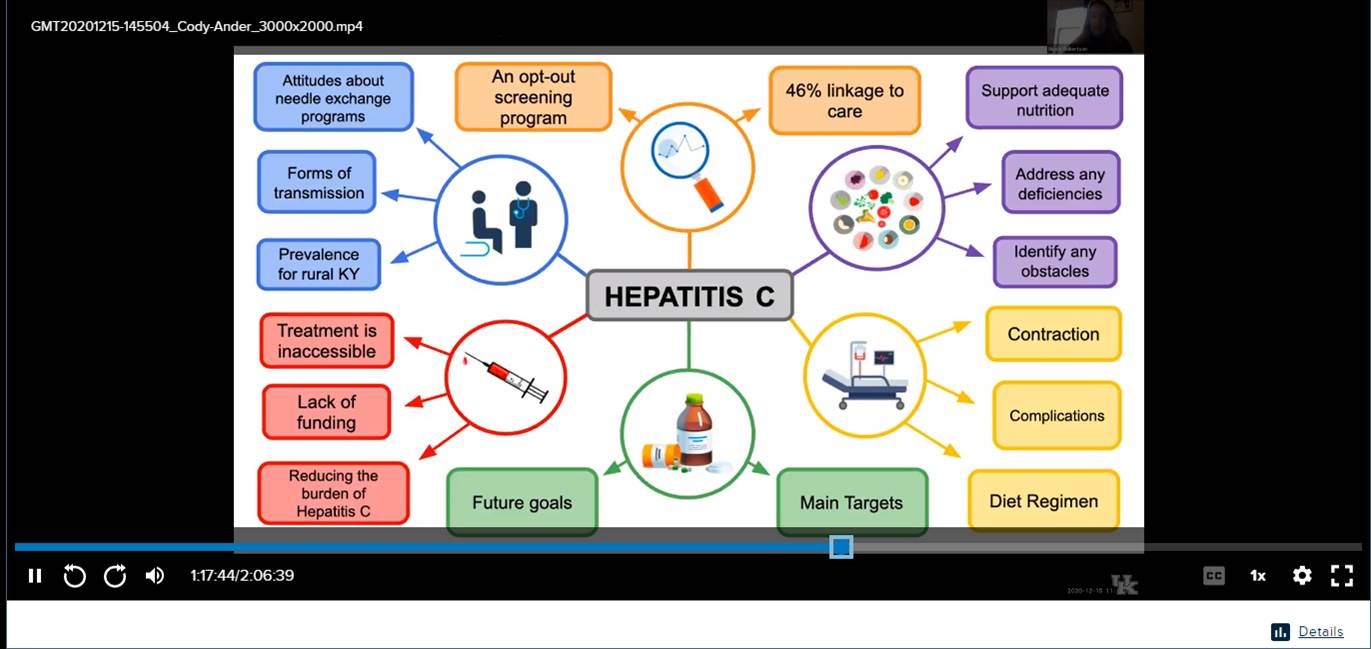MD 828 Symposium Provides Unique Opportunity for Students to Apply Course Knowledge
As a new course director for MD 828: Gastrointestinal System and Nutrition, April Hatcher, PhD, knew she wanted to put a creative spin on how she taught these subjects to her second-year students.
Capitalizing on the expansion of virtual platforms, she and a team of faculty and staff at the University of Kentucky College of Medicine established a unique opportunity for students to apply the knowledge gained from the course.
Dr. Hatcher, who is an associate professor of neuroscience, and clinical director Lauren Craig, MD, assistant professor of medicine, organized a two-hour virtual symposium during the final week of MD 828 for students to hold online presentations on what they learned about GI-related topics.
Functioning as a mini-conference, the symposium was designed for students to relate GI diseases or conditions to a sociocultural perspective, integrate perspectives of multiple stakeholders, and describe how the experience will influence their approach to patients when they become physicians.
“This seemed like a good way to adapt to the Zoom era,” Dr. Hatcher said. “We’re thankful for all of our faculty, staff, and students who helped make this idea come to fruition and turn out so successful. Dr. Craig and I were impressed by the student’s creative and compassionate approach to understanding the holistic impacts of a disease on patients and their families.”
"One of our goals this year was to find a creative way for students to move beyond an understanding of the pathophysiology of a disease process and to explore the societal and cultural factors that are integral to the lived experience of the patient,” Dr. Craig added. “We also wanted to find a unique way for students to connect as peers in a virtual learning environment."
Dean Robert DiPaola, MD, attended the symposium and was impressed by the students’ thorough research to create such advanced presentations.
“Our students capitalized on this opportunity and used their projects to develop in-depth knowledge they will use in their future careers. The results were quite extraordinary,” Dean DiPaola said. “In a time when faculty had to quickly adapt their instruction to the COVID-19 pandemic, Dr. Hatcher and Dr. Craig developed an innovative model for how virtual medical education can work so successfully.”
Thirty-six groups of six students covered six major categories: malnutrition, oral/pharyngeal health, esophageal/gastric disease, chronic liver disease, inflammatory bowel disease, and GI cancers. Each group member was tasked with interviewing a person – such as a patient, physician, community member, or family caregiver – to contribute to an integrated understanding of the GI disease or condition.
Students became experts on their own topics and were able to form creative teaching methods, such as role-play of a new patient diagnosis of colon cancer and social-media for audience participation for understanding of gastroesophageal reflux disease. Meanwhile, they learned from other student presenters as they chose five other peer presentations to attend during the remainder of the symposium. During any one twenty-minute interval, there were six concurrent peer presentations across the six major GI themes provided.
After the presentations, faculty selected the best in each of the six categories.
Nicole Robertson of the Lexington Campus was part of the “Hep C by 4D” group that explored a holistic approach to Hepatitis C in Kentucky. Her group was voted best presentation in the chronic liver disease category. Robertson said working with a team that interviewed different stakeholders provided quality experience she will use when working with multidisciplinary teams as a physician.
“By interviewing a wide variety of perspectives such as patients, rural physicians, addiction medicine physicians, needle exchange leadership, and dietitians, I was better able to understand the multidisciplinary nature of providing the best care to patients with Hepatitis C,” Robertson said.
Ariel Porter, a student on the Northern Kentucky Campus, was part of the group, “GI Joes,” presenting on gastroesophageal reflux disease, which won in the esophageal/gastric disease category. Porter said a benefit to the symposium’s virtual format was that it fostered collaboration among students across the UK College of Medicine – its regional campuses in Bowling Green and Northern Kentucky, along with its main campus in Lexington.
“The symposium helped me to think outside of the classroom about how the diseases would present in the real world with real people rather than just in a textbook,” Porter said.
The symposium was made possible thanks to faculty members who served as course instructors and judges of presentations; staff who provided administrative and technology support; and clinical site directors who bridged the connections among campuses.
A full list of group winners can be found below:
Malnutrition
Group 1D: Lost in the Desert
Group members: Emily Cassim, Emily Gosser, Stuart Jones, Dylan Sanford, Alexandra Vaynerman
Seeking Oasis: Navigating Through Food Deserts and Other Inaccessibility to Nutrition
Oral/pharyngeal Health
Group 2B: Mountain Dew Mouths
Group members: Maximo Acevedo, Jonathan Greene, Kerrigan Samons, Madeline Tierney, Kaylee Wilson
Barriers to Dental Caries Prevention in Appalachia Kentucky
Esophageal/Gastric Disease
Group 3D: GI Joes
Group members: Nicholas Bontrager, Kayla Mattingly, Hares Patel, Kathryn Perry, Ariel Porter, Jeremiah Wayne
Gastroesophageal Reflux Disease
Chronic Liver Disease
Group 4D: Hep C by 4D
Group members: Aaron Adams, Jodi Llanora, Tapas Parikh, Nicole Robertson, Patrick Stalcup, Alexius Stevenson
Hepatitis C in Kentucky: A Holistic Approach
Inflammatory Bowel Disease
Group 5C: Gut Feelings on IBD
Group members: Emily Blandford, Omar Brijawi, Rebeckah Fairchild, Jarrett Mauk, Claire Ottman, Aaron Silverstein
Exploring the Psychological Causes and Effects of IBD
GI Cancers
Group 6F: No Ifs, Ands, or Butts
Group members: Taylor Daughrity, Coleman Harber, Kendall Horan, Sean Noble, Kaitlyn Samuels, Ryan Yadav
New Diagnosis of Adenocarcinoma of the Colon Patient Presentation
